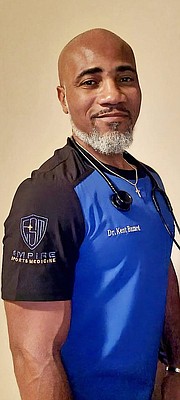By Dr Kent Bazard
IN the wake of recent tragic events, including the devastating loss of a local student during basketball practice in the Bahamas and other similar incidents across the United States, it is imperative to shine a light on the sobering issue of sudden death in youth sports. This article is dedicated to understanding the various causes of such unfortunate occurrences, the significance of pre-participation evaluations, and the urgent need for vigilance within the sporting community.
Understanding the Tragedy: Causes of Sudden Death in Youth Sports
Sudden death in youth sports is a deeply distressing and often unanticipated event that has left communities in mourning. Several factors can contribute to such tragedies, including:
Cardiac Conditions:
Undiagnosed or pre-existing heart conditions, such as hypertrophic cardiomyopathy, irregular heart rhythms (arrhythmias), or congenital anomalies, can suddenly manifest during strenuous exercise.
Heat-Related Issues: Prolonged exposure to high temperatures and inadequate hydration can lead to heatstroke, a life-threatening condition that can occur during intense training or competition.
Exertional Rhabdomyolysis:
This condition, characterised by muscle tissue breakdown, can occur when athletes engage in strenuous exercise without proper conditioning or preparation.
Trauma: Accidents and injuries during sports activities, such as head injuries or sudden impact events, can lead to catastrophic outcomes if not promptly addressed.
The Importance of Pre-Participation Evaluations
In a previous article, I discussed how Pre-participation evaluations (PPE) are a critical component of youth sports safety. These comprehensive medical assessments aim to identify underlying health issues that may put athletes at risk. PPEs typically include:
Medical History: A thorough review of an athlete’s medical history helps identify pre-existing conditions, previous injuries, or family history of cardiac issues.
Physical Examination: A physical examination assesses overall health, including cardiovascular fitness, musculoskeletal function, and signs of underlying medical concerns.
Cardiac Screening: An electrocardiogram (ECG or EKG) can detect abnormal heart rhythms or structural abnormalities that might increase the risk of sudden cardiac events.
Discussion: Athletes and their parents or guardians should engage in discussions with healthcare professionals about the importance of reporting symptoms like chest pain, shortness of breath, or unexplained fainting.
The Collective Responsibility
Sudden death in youth sports is a stark reminder of the vulnerability of young athletes. While no preventive measure can guarantee absolute safety, a collective responsibility exists within the sports community:
Education: Coaches, athletes, parents, and medical staff must be educated about recognizing warning signs and responding swiftly to emergencies.
Emergency Preparedness: Having an emergency action plan in place at all sporting events is crucial, ensuring that timely and appropriate care can be administered.
Access to Medical Professionals: Establishing accessible and rapid access to medical professionals during practices and games is essential.
Emphasizing Hydration: Promoting proper hydration and heat management practices, particularly in hot climates like the Bahamas, is critical.
In conclusion, sudden death in youth sports is a heartbreaking reality that underscores the importance of proactive measures to ensure the safety of young athletes. While we cannot eliminate all risks, we can minimize them through comprehensive pre-participation evaluations, education, and a commitment to swift action when emergencies arise. Let these tragic events serve as a poignant reminder of our duty to protect and support our youth in their sporting endeavors.
Our hearts go out to the families and communities affected by these recent losses, and we share in the collective determination to prevent such tragedies in the future.
• Dr Kent Bazard is a Bahamian sports medicine physician, sports performance coach, sports nutrition specialist and founder of Empire Sports Medicine. Our mission is to empower athletes to reach new heights while safeguarding their health and well-being. We understand the unique demands of sports activities, and we are dedicated to helping athletes prevent injuries, overcome challenges, optimise nutrition and performance.





Comments
Use the comment form below to begin a discussion about this content.
Sign in to comment
OpenID